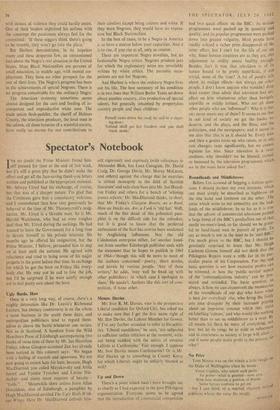Up and Down There's a point which hasn't been 'brought
out as clearly as I had expected in the post-Pilkington argumentation. Everyone seems to be agreed that the introduction of commercial competition THE SPECTATOR, JULY 20. 1962 had two quick effects on the BBC: its serious programmes were pushed up in quantity and quality, and its popular programmes were pushed down into greater vulgarity. Most people have readily echoed a rather prim disapproval of the latter effect, but I can't for the life of .me see why. Since human creatures are as they are, this adjustment to reality seems healthy enough. Besides, isn't it true that television is of its nature bound to be pretty superficial, if not trivial, most of the time? A lot of peop:c talk about its malign effects—but always on other people. I don't know anyone who wouldn't drop dead sooner than admit that television had any effect on him whatsoever other than benignly soporific or mildly irritant. Who are all these other people who are 'influenced'? Why is it that on never meets any of them? It seems to me that in our kind of society we get the books we deserve, and the plays, and the films, and the politicians, and the newspapers; and it seems to me also that this is as it should be. Every' now and then a genius turns up who raises. or at any rate changes, taste significantly, but we cannot legislate for him. Since television is a mass medium, why shouldn't ' we be blessed, cursed, or bemused by the television programmes which we in the mass have asked for?


































 Previous page
Previous page